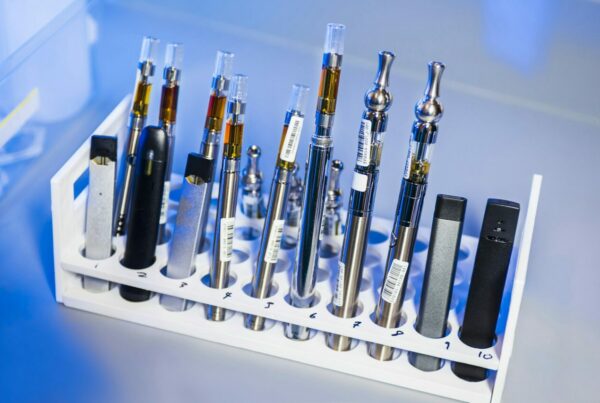N, N-Dimethyltryptamine (DMT) is a compound commonly found in various plants and animals, known for its intense yet short-lived psychedelic effects upon ingestion.
There is growing evidence to suggest that DMT, which is naturally produced in the body, plays crucial roles in both the peripheral and central nervous systems, possibly functioning as a neurotransmitter.
DMT is capable of inducing strong psychedelic effects, but usually does not result in many negative effects, apart from potential cardiovascular problems when administered in high doses through injection.
Let’s explore DMT and its diverse roles, ranging from recreational use to its promising potential in scientific research and therapeutic applications.

DMT Briefly Explained: What is it?
| Aspect | Details |
| Name | N, N-Dimethyltryptamine (DMT) |
| Classification | Indole alkaloid |
| Occurrence | Naturally found in multiple plants and animals |
| Psychoactive Effects | Provides brief, intense psychedelic experiences upon ingestion. |
| Method of Consumption | Can be smoked, injected, or orally consumed. |
| Duration of Effects | Short duration, typically lasts between 5 to 30 minutes. |
| Chemical Structure | Comprises a tryptamine core with two methyl groups attached to the amine nitrogen atom. |
| Metabolism | Rapidly metabolized by the body, broken down by monoamine oxidase (MAO). |
| Cultural Use | Historically used in various ceremonial and shamanic rituals by indigenous cultures. |
| Other names | Dimitrifantasiabusinessman’s tripBusinessman’s special45-minute psychosisspiritual molecule |
The Role of DMT in Mental Health
N, N-Dimethyltryptamine (DMT), a compound famous for its potent psychedelic effects, is generating interest for its potential benefits to mental health. Despite its historical association with intense visionary experiences, recent research suggests a connection between DMT and mental wellness.
Influence on Psychological and Emotional Well-being
The psychedelic effects of DMT are known to invoke deep emotional reactions and shift states of consciousness. These effects might pave the way for therapeutic strategies to address mental health conditions, aid in emotional processing, and provide new perspectives on personal traumas.
Neuroplasticity and Brain Function
Research suggests that DMT may influence neuroplasticity, enhancing the brain’s ability to adapt and reorganize. Investigating its impact on synaptic plasticity and neural connectivity could present potential treatments for conditions associated with neural maladjustments.
Potential Therapeutic Use for Mental Health Disorders
Initial research underlines the potential of DMT in treating conditions such as depression, addiction, and PTSD. Its ability to induce mystical or spiritual experiences could offer a unique angle to psychotherapy and aid in transforming negative thought processes.
Investigating the natural presence of DMT in the body shows its significance in mental health resilience, stress management, and overall psychological well-being. Understanding how the body regulates DMT levels internally could lead to the development of new therapeutic strategies.
DMT and Mental Health Disorders
| Mental Health Disorder | Description | Effectiveness of DMT | Benefits |
| Depression | A mood disorder typified by constant sadness, lack of interest, and reduced motivation | Early studies suggest DMT could relieve symptoms by inducing deeply emotional experiences. | The rapid onset of DMT and its ability to spark transformative experiences could provide new, unique therapeutic methods for altering negative thought patterns and enhancing emotional processing |
| Post-Traumatic Stress Disorder (PTSD) | A mental health condition triggered by traumatic events, resulting in flashbacks, intense anxiety, and intrusive thoughts | Preliminary research indicates DMT’s potential to control symptoms by inducing spiritual or mystical experiences, which could help patients reshape traumatic memories | DMT’s potential to induce altered states of consciousness could help facilitate emotional processing and provide a fresh perspective on traumatic experiences |
| Addiction | A complex disorder characterized by compulsive participation in rewarding stimuli, despite adverse consequences | Some research suggests DMT could play a role in interrupting addictive patterns and reducing cravings for substances | The capacity of DMT to provoke powerful and transformative experiences could help individuals modify their behavioural patterns and confront their addictions |
Approaches to Utilizing DMT
DMT, renowned for triggering short but potent psychedelic experiences, can be administered in a variety of ways. The chosen method often hinges on the desired intensity and duration of the trip.
Smoking:
When smoked in a pipe or vaporized, DMT requires meticulous temperature control to avoid overheating and burning the substance. The onset of a psychedelic journey is almost instantaneous when DMT is smoked, typically lasting from 5 to 15 minutes.
Oral Intake:
Taking DMT orally leads to slower onset effects that last significantly longer, often several hours, due to the slower decomposition of DMT when mixed with an MAOI.
Injection:
DMT can be directly injected into the bloodstream for rapid and potent effects.
This approach results in an immediate and strong experience, but it necessitates precise dosage and carries increased risks.
Insufflation (Snorting):
Inhaling DMT results in a slower onset of effects compared to smoking but may provide a more prolonged experience.
Sublingual or Buccal Administration:
When absorbed through the oral mucosa, this method serves as an alternative to smoking and offers a longer, though less intense, experience.
Determining Therapeutic Dosage: N, N-Dimethyltryptamine (DMT)
For smoking, the suggested dosage ranges from 20 to 40 mg, while for intravenous use, the recommended dosage is between 0.2 to 0.4 mg per kg of body weight. These dosage guidelines are primarily applicable to clinical research, particularly for intravenous use.
- Higher doses administered intravenously are associated with intense visuals, temporary loss of control, and a mixed state of anxiety and euphoria
- Notably, less desirable effects have been observed with lower doses
- Recreational doses of smoked DMT typically range from 40 to 50 mg, sometimes even reaching up to 100 mg
- Different doses of intravenous People who have experienced near-death sensations associated with DMT (7, 14, 18, and 20 mg solutions) have reported enduring positive changes in their psychological well-being.
Availability of DMT
ProductsOsmosis – 4-ACO-DMT Ethereal Essence Tincture
This tincture is promoted as containing 4-Acetoxy-N, N-dimethyltryptamine (4-AcO-DMT), a DMT variant. Tinctures are liquid extracts intended for oral use, and this specific product may offer a distinct experience from standard DMT.
Lucid Supply Co. – 5-MeO DMT Vaporizer
This item is a vaporizer that delivers 5-Methoxy-N, N-dimethyltryptamine (5-MeO-DMT). Renowned for its potent, transformative, and often short-lived experiences, 5-MeO-DMT is its active component.
Integral Alchemist – Acacia – 1ml DMT Vape Cartridge
The DMT vape cartridge from Integral Alchemist comes pre-loaded with N, N-Dimethyltryptamine. This product is presumably aimed at those who favor a discreet and convenient method of DMT ingestion.
Deadhead Chemist – 5-MeO-DMT Cartridge
This cartridge houses 5-Methoxy-N, N-dimethyltryptamine (5-MeO-DMT), a substance known for its deep and intense effects.
Potential mental health benefits may tie in with personal growth, spiritual experiences, or therapeutic applications designed to enhance emotional well-being.
Deadhead Chemist – N, N DMT Cartridge
Another product from Deadhead Chemist, this cartridge holds the traditional N, N-Dimethyltryptamine. Cartridges provide a user-friendly way of DMT consumption, promising a more controlled and consistent experience.
Concluding Remarks
The consumption of N, N-Dimethyltryptamine (DMT) in
How can I safely experiment with DMT?
It’s crucial to proceed with caution when experimenting with DMT. Always consider the potential legal implications and risks associated with its use.
Before starting, it’s recommended to consult with a healthcare provider or a mental health professional to ensure the experience is safe and supportive.
Lastly, make sure to procure DMT products from reliable sources like Shroom Delivery Toronto Canada Online Dispensary to ensure the quality and safety of the products.
The journey through mental health therapy is both thrilling and complex. The ability of certain substances to induce powerful yet transitory psychedelic experiences opens the door to innovative therapeutic approaches.Initial studies indicate its potential role in emotional processing, personal growth, and potentially
Mental health treatment’s substantial influence necessitates careful contemplation and responsible application.
For those interested in responsibly exploring DMT products, trusted sources like Shroom Delivery Toronto Canada Online Dispensary can offer guidance and provide a variety of options.
Frequently Asked Questions:
What distinguishes the effects of different DMT products on mental health?
For instance, vaporizers might yield immediate effects, while tinctures or vape cartridges may provide more stable and consistent dosages.
Including derivative compounds or 5-MeO-DMT can result in varying degrees of intensity and different types of effects on mental health.
These minor differences underscore the importance of selecting a DMT product based on personal preferences and mental health goals.
Can DMT contribute to enduring changes in mental health and personal development?
There are anecdotal reports indicating that DMT-induced experiences could have long-term effects on mental health and personal growth.
Profound or transformational experiences, such as those resembling near-death experiences, are often associated with reports of ongoing positive changes in psychological health and personal development.
Despite these experiences being intense and brief, they often lead to introspection, spiritual revelations, and a sense of unity or enlightenment.
Following these experiences, individuals frequently report a refreshed perspective on life, enhanced emotional resilience, and an increased appreciation for life.
What is the most effective way to use DMT for mental health purposes?
It’s crucial to make informed decisions, which involves thorough research and understanding the effects of the compound.
Advice from mental health professionals or seasoned users can offer valuable insights into potential risks and advantages.
Understanding personal tolerance and mental preparedness is also essential, as is ensuring a supportive and safe environment for the experience.
How does DMT stack up against other psychedelic treatments such as psilocybin or LSD in mental health therapy?
DMT’s effects, their duration, and intensity distinguish it from other psychedelics like psilocybin or LSD. Its shorter duration creates unique experiences.
These experiences, caused by high-intensity, short-acting psychedelics, call for unique therapeutic strategies in mental health, which are different from those used for long-lasting psychedelics.
Recommended Additional Reading:





